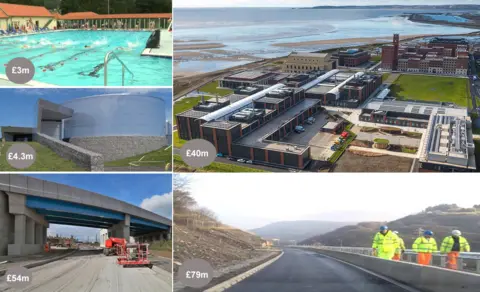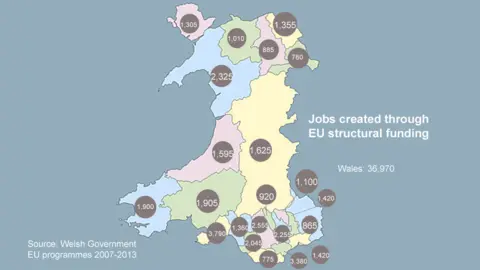What happens next with Wales' EU funding?
 BBC
BBCSince 2000, £5.3bn has flowed into Wales from the European Union to help its most deprived communities. But what will happen after Brexit? This is one of the questions being asked in the general election.
Financial help has focused largely on west and north west Wales and the south Wales valleys.
Structural funds, as they are called, have been tasked with reducing inequalities and increasing opportunities.
There has also been specific money for rural areas, particularly the Common Agricultural Policy (CAP), with £260m (2014 figure) paid into Wales in direct payments to farmers for producing food and another fund to help jobs and services in towns and villages.
In 2014 alone, structural funds plus CAP money amounted to £658m.
Or if you look at it another way, EU funding in Wales is around 10% of the NHS Wales budget.
That may still seem small as a proportion of the size of the Welsh economy - worth £55.8bn or just over 1% - but it still significant because of what that levers in and enables.
For instance business support in Wales is partly EU-funded, as is Finance Wales which invests in Welsh companies. Jobs Growth Wales which helps young people into employment is another beneficiary.
The structural fund billions have arrived in three tranches. They were awarded to Wales because productivity - calculated as Gross Value Added (GVA) - in the west Wales and the Valleys area was below 75% of average GVA across the EU.
Wales - along with Cornwall - are the only two areas of the UK which have now had that money three times in a row.
Back in 2000, the first programme, called Objective One, was hailed as a "once-in-a-generation opportunity to transform our economy" by the Welsh Government. There were hopes of 43,500 new jobs but it was criticised for lacking focus and spreading the benefits too thinly.
There was also concern that both the first and second tranches of money were not used as strategically as they might have been and there had been not enough involvement of businesses.
What has it paid for?

From parenting classes to dual carriageways; from bridges, arts centres to lidos, as well as new university campuses, the money from Brussels has helped build much of the infrastructure around Wales.
It has also helped fund organisations that have become part of everyday life.
Programmes approved in the current round of funding, up to 2020, include numerous jobs and skills initiatives and nearly £85m towards helping small enterprises start up and expand.
Individual projects include £15m for "buildings as power stations" energy research by Swansea and Cardiff universities, £23m towards improving the A40 in Pembrokeshire and £10.5m towards Deep Green tidal energy off Anglesey.
So how effective has it been?
It has been argued that the sheer fact that west Wales and the valleys was awarded this special pot of money twice more after those early Objective One years is evidence that it has not worked.
But others claim that we cannot predict what the state of the Welsh economy might have been like if those extra billions of pounds had not been spent.
Some would argue that without it Wales would have been even poorer.

The most recently completed structural funds programme, which lasted from 2007 to 2013, claims to have created nearly 37,000 jobs and helped more than 18,000 enterprises.
But it has wider aims than just getting more people into work. The hope has been to make Wales wealthier too.
When Objective One money arrived, GVA in the West Wales and the Valleys region was 62.1% of the UK average. But 15 years later, with its third injection of money, GVA was still only a little higher at 63.3% and has consistently been at the bottom of UK regions.
It must be remembered though that these are all relative to how the UK is doing as a whole.
As a result of the relative increase in the UK, GVA in Cornwall started at 74% of the UK average in 2000 but by 2015 it was lower at 70.9%.


Would the political parties compensate Wales for the loss of EU income - and how?
The Conservatives propose a UK Shared Prosperity Fund to reduce inequalities between communities across the four nations of the UK.
However there are suggestions that it would not be handed over to Welsh Government to do as it willed. It is expected that the UK government would instead work with the Welsh Government and others to decide how it would be spent.
There is a suggestion that they do not feel the experience has been money well spent and they want a close eye on where regeneration funding goes in the future.
Last October, Welsh Secretary Alun Cairns attacked what he called the "mismanagement" of £4bn of EU funds by Welsh Government. He said European structural funds were supposed to be a temporary fix but communities had been let down.
That does not suggest that his party would continue to may money for poorer communities in the same way it has been.
Labour has promised to give Wales the same amount of economic aid post-Brexit. Its Welsh manifesto said there was a need for the UK government to "make good" on promises made during the referendum campaign that Wales would not lose a penny in funding as a result of Brexit.
The party said it would ensure there was no drop in EU structural funding as a result of Brexit until the end of the current EU funding round. And then as part of its plans to rebalance the economy, it would ensure that no region or nation of the UK would be affected by Brexit for the remainder of this Parliament.
The Lib Dems say regional support for deprived areas must be protected, as well as support for the farming, tourism and creative industries.
Its Welsh manifesto says Wales "cannot afford" the Conservatives' "damaging approach to Brexit."
Plaid Cymru is demanding "that every single penny we lose from Europe is replaced by Westminster".
The party believes Wales is under threat of losing £680m a year and said it would not "accept a penny less". It also outlines in its "action plan" for Wales a £7.5bn investment programme to fund vital infrastructure projects.
UKIP believes coastal towns have suffered in comparison to big cities and says they will be top of the list when it comes to the replacements for European regional development grants.
Its manifesto also says the UK will have more room to manoeuvre with its regional and industrial policy, without being tied by EU state aid rules.
